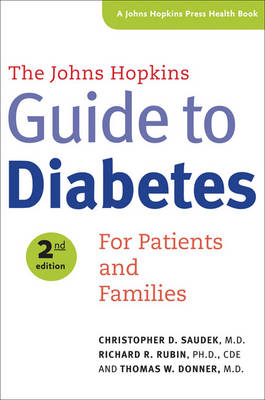
The Johns Hopkins Guide to Diabetes
Johns Hopkins University Press (Verlag)
978-1-4214-1180-4 (ISBN)
- Titel z.Zt. nicht lieferbar
- Versandkostenfrei innerhalb Deutschlands
- Auch auf Rechnung
- Verfügbarkeit in der Filiale vor Ort prüfen
- Artikel merken
Living with diabetes is a balancing act of monitoring blood glucose, food intake, and medication. It makes sense that individuals who have diabetes do best when they understand their condition and how to control it. The Johns Hopkins Guide to Diabetes is a comprehensive and easy-to-read guide to this complex condition, answering questions such as: What are the differences between Type 1 and Type 2 diabetes? How are the different forms of this disease treated? Can gestational diabetes become a permanent condition? Can diabetes ever be managed successfully with diet and exercise alone?
The second edition of this valued resource includes up-to-date information on* How diabetes is diagnosed* The two types of diabetes* The role of genetics * Improvements in blood glucose measurement* Good nutrition and regular exercise* Insulin and non-insulin medications* Insulin pumps* The emotional side of diabetes* How families are affected and how they can help* What to do if diabetes affects your work* Complications from head to toe Written by a team of Johns Hopkins diabetes specialists, this authoritative guide will help people who have diabetes work effectively with their care team to control their diabetes and maintain good health.
Christopher D. Saudek, M.D., was a professor of medicine at the Johns Hopkins University School of Medicine and founder of the Johns Hopkins Diabetes Center. Richard R. Rubin, Ph.D., CDE, was a professor of medicine and pediatrics at the Johns Hopkins University School of Medicine and a staff member at the Johns Hopkins Diabetes Center and the Johns Hopkins Pediatric Diabetes Clinic. Thomas W. Donner, M.D., is an associate professor of medicine at the Johns Hopkins University School of Medicine and is director of the Johns Hopkins Diabetes Center.
Preface
Acknowledgments
Part I: Understanding Diabetes
1. The Diagnosis of Diabetes: Making It and Hearing It
2. Types of Diabetes
Part II: Controlling Diabetes
3. Goals of Treatment and How to Reach Them
4. Blood Glucose Monitoring
5. Hypoglycemia
6. Introduction to Nutrition Therapy: Planning and Understanding the Diet
7. Weight Control: Why It Matters and How to Do It
8. Special Considerations in Nutrition Therapy
9. Exercise and Diabetes
10. Treating Type 2 Diabetes with Non-insulin Medications
11. Treating Diabetes with Insulin
12. Types of Insulin
13. Insulin Pumps
Part III: Living with Diabetes
14. The Emotional Side of Diabetes
15. Lessons for Families Who Live with Diabetes
16. Dealing with Psychological Problems
17. Interacting with Health Care Professionals
18. Interacting with the Health Care System
19. Employment and Diabetes
Part IV: Complications
20. Systemic Symptoms
21. Diabetic Ketoacidosis and Hyperosmolar Coma
22. Hardening of the Arteries
23. Diabetic Eye Disease
24. Diabetic Kidney Disease
25. Diabetic Neuropathy
26. Diabetes and the Foot
27. Diabetes and the Skin
Part V: Sexuality, Pregnancy, and Genetics
28. Diabetes and Sexuality
29. Diabetes and Pregnancy
30. The Genetics of Diabetes
Part VI: The Future of Care
31. Diabetes Research
32. The Prognosis
Index
| Erscheint lt. Verlag | 25.6.2014 |
|---|---|
| Reihe/Serie | A Johns Hopkins Press Health Book |
| Zusatzinfo | 47 Illustrations, black and white |
| Verlagsort | Baltimore, MD |
| Sprache | englisch |
| Maße | 156 x 235 mm |
| Gewicht | 726 g |
| Themenwelt | Sachbuch/Ratgeber ► Gesundheit / Leben / Psychologie ► Krankheiten / Heilverfahren |
| Medizin / Pharmazie ► Medizinische Fachgebiete ► Geriatrie | |
| Medizinische Fachgebiete ► Innere Medizin ► Diabetologie | |
| Medizinische Fachgebiete ► Innere Medizin ► Endokrinologie | |
| Studium ► 1. Studienabschnitt (Vorklinik) ► Biochemie / Molekularbiologie | |
| Studium ► Querschnittsbereiche ► Prävention / Gesundheitsförderung | |
| ISBN-10 | 1-4214-1180-6 / 1421411806 |
| ISBN-13 | 978-1-4214-1180-4 / 9781421411804 |
| Zustand | Neuware |
| Informationen gemäß Produktsicherheitsverordnung (GPSR) | |
| Haben Sie eine Frage zum Produkt? |
aus dem Bereich


